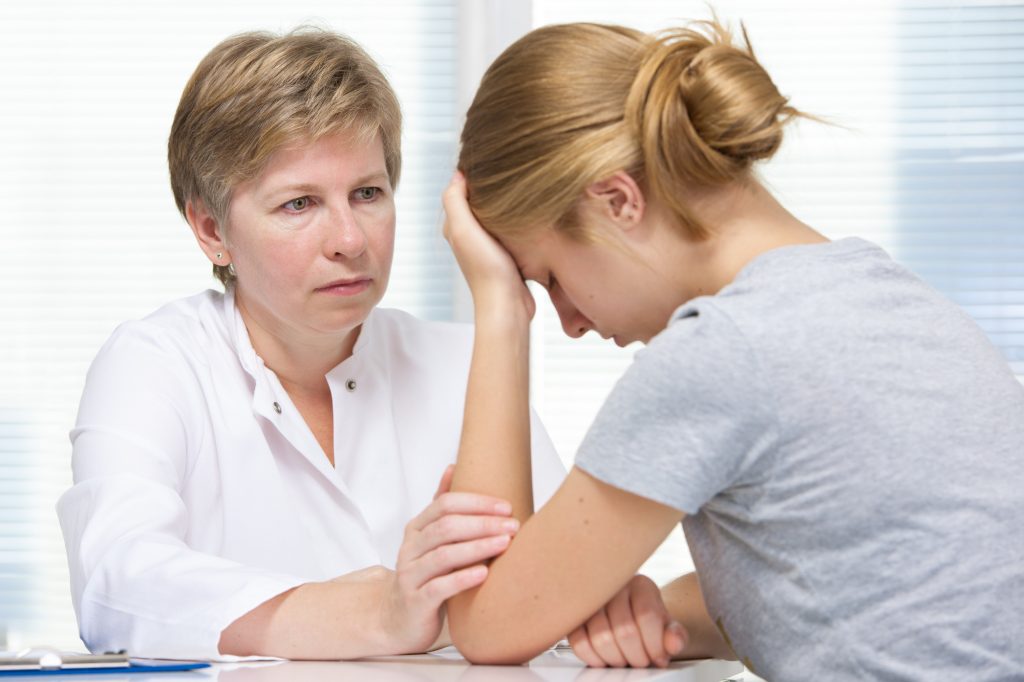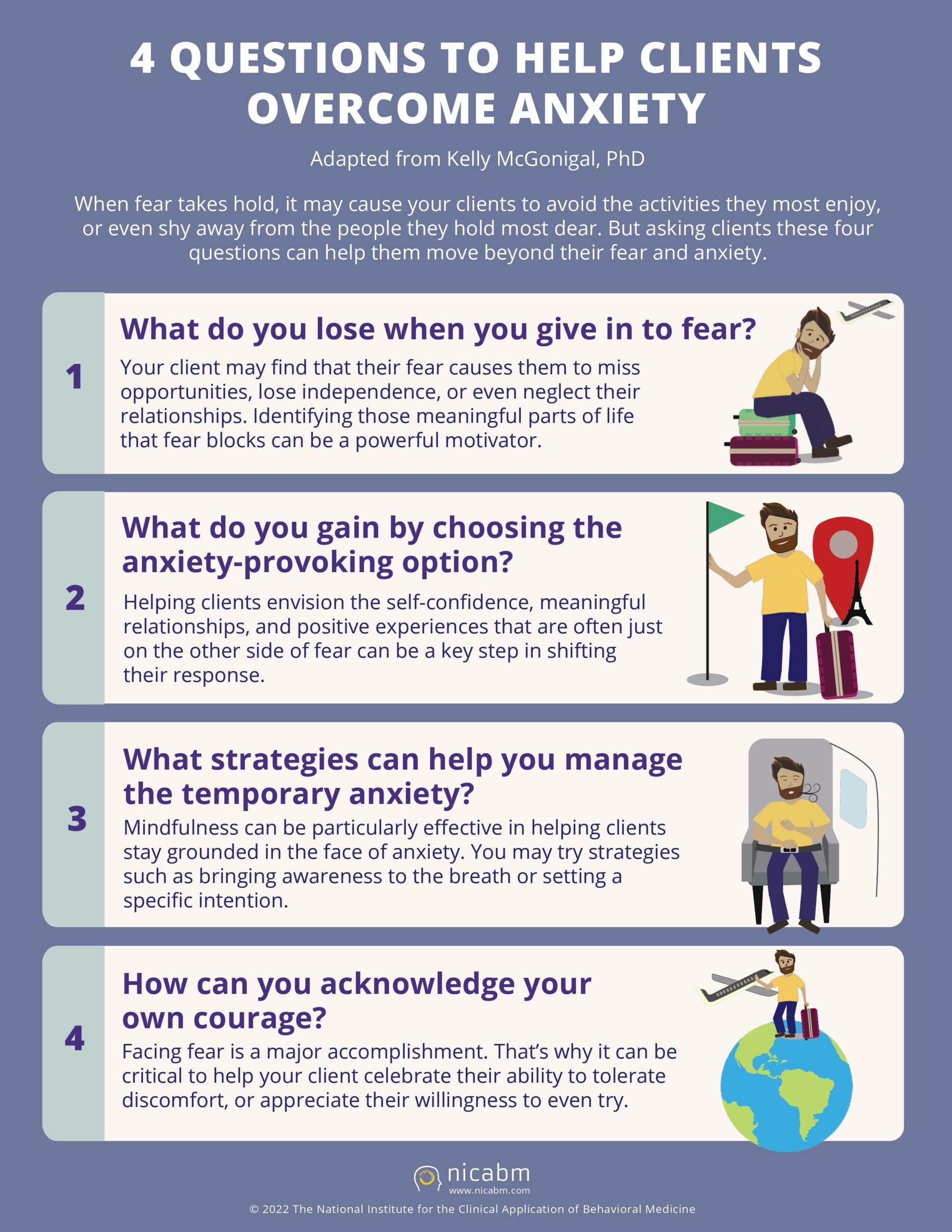Discover meaningful relief with a licensed therapist for anxiety you can trust
Discover meaningful relief with a licensed therapist for anxiety you can trust
Blog Article
Checking Out Different Techniques in Counselling for Anxiousness Problem for Enduring Change
When taking on anxiousness disorders, it's necessary to explore a selection of counseling methods. Each approach supplies distinct insights and tools to aid you manage your symptoms efficiently. You may discover that integrating strategies can produce the very best results. Nevertheless, understanding the nuances of these approaches is key to fostering long-term change. What if the best mix could release a new level of psychological well-being for you?
Recognizing Anxiousness Conditions: A Quick Summary
Anxiety problems, which impact countless people worldwide, can greatly affect life. You might experience overwhelming sensations of concern or stress that appear unmanageable. These feelings can cause physical signs like a racing heart, sweating, and even lightheadedness. Usual sorts of anxiety problems consist of generalized anxiousness problem, panic attack, and social stress and anxiety condition. Each has one-of-a-kind signs, but they all share a tendency to interrupt your routine and relationships.Understanding the origin of your anxiousness is vital. It could come from genetics, mind chemistry, or life experiences. Identifying your triggers can aid you manage your reactions much better. It's essential to bear in mind that you're not alone in this battle. Many individuals encounter comparable challenges, and looking for assistance is a solid step toward feeling much better. By finding out about anxiety problems, you're currently on the course to understanding and managing your condition a lot more effectively.
Cognitive-Behavioral Treatment: Testing Unfavorable Idea Patterns
In Cognitive-Behavioral Treatment, you'll begin by determining the adverse thought triggers that add to your anxiousness. Once you identify these ideas, you'll work with changing them with even more favorable options. With each other, you'll develop reliable coping approaches to assist manage your stress and anxiety in daily situations.
Identifying Unfavorable Idea Triggers

Recognizing the particular triggers behind your adverse thoughts can be important in taking care of anxiousness when you run into moments of distress. Begin by focusing on scenarios that provoke sensations of concern or concern. Is it a congested space, a forthcoming due date, or a conversation with specific people? Take down these circumstances in a journal. This will certainly help you determine patterns in your reasoning. Additionally, notification physical sensations that accompany your negative ideas, like a racing heart or rigidity in your upper body. By pinpointing these triggers, you gain understanding right into what's sustaining your anxiousness. Understanding these links is the very first step in challenging those thoughts and ultimately restoring control over your psychological responses.
Changing Ideas With Positives
Challenging adverse idea patterns is a crucial action in changing your state of mind and reducing stress and anxiety. You might frequently locate yourself trapped in cycles of insecurity or tragic thinking. Rather than allowing these ideas dictate your feelings, method changing them with positive affirmations or sensible choices. When you believe, "I can't manage this," change it to, "I can take care of challenges one step at a time." This basic adjustment can considerably influence your emotional state. Frequently determining and responding to these unfavorable thoughts aids produce a healthier internal dialogue. Remember, it takes time and effort, however constantly exercising this strategy can cause long-term adjustment, encouraging you to encounter anxiousness with renewed confidence and durability.
Building Coping Techniques Together
Changing adverse ideas is just the beginning of handling anxiety efficiently. To create lasting change, you require to build coping approaches that encourage you. Cognitive-Behavioral Treatment (CBT) assists you identify and test those purposeless thought patterns. Together, you and your therapist can discover exactly how these thoughts impact your sensations and behaviors.Start by establishing useful techniques, like journaling or mindfulness workouts, that enable you to face anxiety head-on. When you encounter your concerns slowly, you'll learn to react in different ways.

Mindfulness and Acceptance-Based Approaches: Cultivating Present-Moment Recognition
As you navigate the complexities of anxiety, integrating mindfulness and acceptance-based approaches can substantially enhance your capability to grow present-moment awareness. By concentrating on the present moment, you'll discover that you can observe your ideas and sensations without judgment (Counseling services for anxiety). This method aids you acknowledge your anxiety without really feeling bewildered by it.Engaging in mindfulness exercises, such as deep breathing, body scans, or assisted meditations, enables you to ground on your own in your current experience. Acceptance-based methods urge you to embrace your emotions instead of deal with against them. When you accept your sensations, they shed their power over you.Incorporating these practices into your everyday routine can change just how you react to anxiety. You'll create resilience and learn to navigate difficult circumstances with better convenience. Inevitably, growing present-moment recognition lays the foundation for lasting change, empowering you to lead a more fulfilling life
Exposure Therapy: Confronting Worries Slowly
Exposure therapy helps you confront your fears in a gradual way, making it less overwhelming. You'll learn techniques to encounter anxiety-provoking scenarios step by step, while additionally constructing coping strategies to handle your reactions. This method empowers you to take control and minimize anxiety in time.
Gradual Exposure Techniques

When encountering anxiousness, slowly facing your worries can be an effective means to regain control. This technique, called steady direct exposure, includes gradually subjecting yourself to the circumstances or things that activate your stress and anxiety. Start with less intimidating circumstances and gradually function your way approximately even more tough ones. For example, if you hesitate of public speaking, you could start by talking in front of a mirror, then advance to sharing ideas with a pal, and at some point address a small team. Each step helps desensitize you to the concern, developing your confidence over time. Bear in mind, it's necessary to pace yourself and celebrate tiny triumphes as you move via this process, reinforcing your ability to manage anxiety properly.
Building Coping Strategies
Structure reliable coping strategies is necessary for managing stress and anxiety, particularly as you confront your concerns slowly - Counseling services for anxiety. One powerful technique is exposure therapy, where you begin by facing your anxieties in a controlled manner. Begin with much less daunting scenarios and slowly function your see this site method up to more tough situations. This progressive direct exposure assists desensitize you to anxiety sets off, making them less overwhelming.Incorporate relaxation methods, such as deep breathing or mindfulness, to calm your mind throughout exposure. Track your development, celebrating small success along the way to enhance your confidence. Remember, it's fine to take your time; the goal isn't perfection but consistent enhancement. By developing these techniques, you'll empower yourself to browse stress and anxiety and embrace life more completely
Psychodynamic Treatment: Discovering Source of Anxiousness
Psychodynamic therapy explores the subconscious mind, exposing the origin of your stress and anxiety. By examining your ideas, feelings, and previous experiences, this method helps you reveal underlying conflicts and unsolved problems that might add to your current anxiousness. You'll work with a specialist to check out youth experiences, relationships, and psychological patterns that form your feedbacks today.As you acquire understanding into these much deeper layers of your mind, you'll begin to recognize exactly how previous events influence your existing behavior. This understanding can bring about catharsis, enabling you to refine feelings you might have suppressed.Through the restorative connection, you can likewise identify defense reaction that might have established with time, providing a more you could try this out clear path to alter. Inevitably, psychodynamic therapy furnishes you with the devices to address your anxiousness at its core, advertising long lasting makeover in your emotional wellness.
Integrative and All Natural Techniques: Incorporating Techniques for Greater Effectiveness
Incorporating various therapeutic methods can boost your journey toward handling anxiousness more efficiently. By integrating components from cognitive-behavioral therapy, mindfulness methods, and alternative strategies, you can create an individualized approach that addresses your special demands. For example, you might use cognitive-behavioral techniques to challenge unfavorable thought patterns while integrating mindfulness workouts to ground on your own in the here and now moment.Additionally, discovering all natural techniques such as yoga exercise or reflection can advertise leisure and reduce anxiety signs and symptoms. This mix permits you to develop better self-awareness and resilience.Experimenting with these varied techniques can aid you discover what resonates most with you. Remember, it's concerning finding a synergy that functions, instead than sticking to a single approach. This integrative method not just supplies immediate alleviation but also cultivates long-term skills for taking care of anxiousness, empowering you to recover control over your life.
The Function of Support Equipments: Building Resilience Via Link
While it may appear that managing anxiety is a solitary journey, having a strong assistance system can play an important function in your strength. Bordering on your own with understanding close friends, household, or support system produces a secure room where you can honestly share your experiences and sensations. You remind on your own that you're not alone in this struggle.These partnerships provide encouragement and can offer practical coping techniques that have functioned for others when you link with others. It's also an opportunity to get point of view; good friends can aid you see circumstances in different ways, lowering sensations of isolation.Moreover, emotional support cultivates a sense of belonging, which can greatly ease anxiety symptoms. By leaning on your assistance system, you can develop strength and deal with difficulties more properly. Keep in mind, reaching out for help is an indicator of stamina, and it can make all the distinction in your trip towards managing stress and anxiety.
Frequently Asked Concerns
What Are the Common Signs And Symptoms of Stress And Anxiety Problems?
You may experience uneasyness, fatigue, problem focusing, irritation, muscle mass great site tension, and sleep disturbances. Physical signs and symptoms can consist of quick heartbeat, sweating, and shivering. Identifying these signs early can aid you look for proper assistance and treatment.
For How Long Does Therapy Typically Last for Anxiousness Problems?
Therapy for stress and anxiety conditions generally lasts anywhere from a few weeks to a number of months. It actually depends upon your private demands, progression, and the methods your therapist uses to assist you handle your stress and anxiety effectively.
Can Drug Be Made Use Of Along With Therapy for Anxiousness?
Yes, medication can certainly be made use of along with treatment for anxiety. Integrating both methods commonly enhances therapy performance, assisting you manage symptoms while checking out underlying concerns via counseling (Counseling services for anxiety). Constantly consult your healthcare supplier for individualized guidance
Are There Self-Help Methods for Managing Anxiousness?
Yes, there are numerous self-help methods for taking care of stress and anxiety. You can exercise mindfulness, participate in normal exercise, maintain a well balanced diet plan, establish a routine, and use deep breathing strategies to help in reducing anxiousness symptoms efficiently.
Just how Do I Know if I Required Specialist Aid for Anxiousness?

Report this page